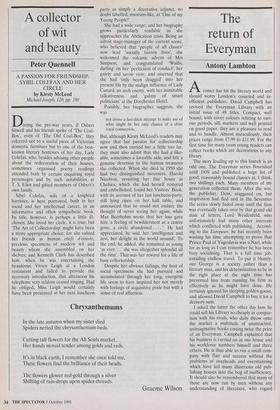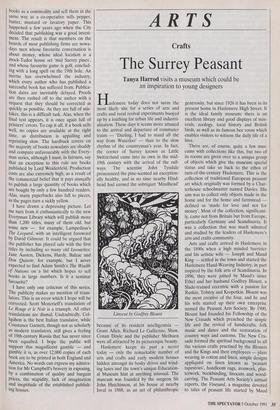The return of Everyman
Antony Lambton
Acomet has hit the literary world and should worry London's cosseted and in- efficient publishers. David Campbell has revived the Everyman Library with an initial issue of 48 titles. Compact, well bound, with cover colours relating to vari- ous periods, silk markers and well printed on good paper, they are a pleasure to read and to handle. Almost miraculously, their prices range from £7.99 to £11.99. For the first time for many years young readers can collect books which are decorations to any library.
The story leading up to this launch is an odd one. The Everyman series flourished until 1939 and published a huge list of good, reasonably bound classics at, I think, two shillings each. Many members of my generation collected them. After the war, the publisher, Dent, staggered on, but inspiration had fled and in the Seventies the series slowly faded away until the firm was eventually taken over by that grand old man of letters, Lord Weidenfeld, who unfortunately had many other interests which conflicted with publishing. Accord- ing to the European, he has recently been wasting his time attempting to prove that Prince Paul of Yugoslavia was a Nazi, while for as long as I can remember he has been busy socialising. That is a full time job, entailing endless travel. To put it bluntly, our George is a society rather than a literary man, and his determination to be in the right place at the right time has prevented him from running his firm as effectively as he might have done. He certainly ignored his sleeping golden goose, and allowed David Campbell to buy it for a derisory sum.
I asked the latter the other day how he could sell his Library so cheaply in compar- ison with his rivals, who daily throw onto the market a multitude of unattractive, unimaginative books costing twice the price of an Everyman. Campbell explained that his business is carried on in one house and his workforce numbers himself and three others. He is thus able to run a small com- pany with flair and success without the problems of overheads and overmanning which have led many illustrious old pub- lishing houses into the bog of inefficiency. It should also be remembered that many of those are now run by men without any understanding of literature, who regard
books as a commodity and sell them in the same way as a co-operative sells pepper, butter, mustard or lavatory paper. This happened a few years ago when the City decided that publishing was a good invest- ment. The result is that members on the boards of most publishing firms are nowa- days men whose favourite conversation is about money, whose ideal location is a mock-Tudor house set 'mid Surrey pines', and whose favourite game is golf, conclud- ing with a long spell on the 19th hole. An inertia has overwhelmed the industry, Which every author who has published a successful book has suffered from. Publica- tion dates are inevitably delayed. Proofs are then rushed off to the author with a request that they should be corrected as quickly as possible. As they are full of mis- takes, this is a difficult task. Alas, when the final text appears, it is once again full of printers' errors. To cap it all, if a book sells Well, no copies are available at the right time, as distribution is appalling and reprinting slow. The hardback covers on the majority of books nowadays are shoddy and compare unfavourably with the Every- man series, although I must, in fairness, say that an exception to this rule are books Published by Lord Weidenfeld. Production costs are also extremely high, as a result of the commercial belief that it pays annually to publish a large quantity of books which are bought by only a few hundred readers. Alas, many paperbacks also fall to pieces, as the pages turn a sickly yellow.
I have drawn a depressing picture. Let me turn from it enthusiastically to the new Everyman Library which will publish more than 1,200 titles, many of them old, but some new — for example, Lampedusa's The Leopard, with an intelligent foreword by David Gilmour. It could be argued that the publisher has played safe with the first titles by including so many old favourites: Jane Austen, Dickens, Hardy, Balzac and Don Quixote, for example, but I never expected to find Adam Smith's The Wealth of Nations on a list which hopes to sell books in large numbers. Is it a seminar favourite?
I have only one criticism of this series. The publicity makes no mention of trans- lators. This is an error which I hope will be corrected. Scott Moncrieff's translation of Le Rouge et le Noir is a triumph. All other translations are dismal. Undoubtedly, Col- lquhon is the best Italian translator, while Constance Garnett, though not as scholarly as modern translators, still gives a feeling of 19th-century Russia that has never since been equalled. I hope the public will support this magnificent gamble — and gamble it is, as over 12,000 copies of each book are to be printed in both England and America. No words can express my admira- tion for Mr Campbell's bravery in exposing, by a combination of quality and bargain prices, the stupidity, lack of imagination and ineptitude of the established publish- ing houses.



















































 Previous page
Previous page